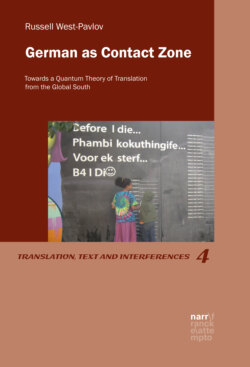Читать книгу German as Contact Zone - Russell West-Pavlov - Страница 14
На сайте Литреса книга снята с продажи.
From translation in culture to culture as translation
ОглавлениеWhat took centre stage in the new version of culturalist translation studies or translational (above all postcolonial: Bassnett and Trivedi, eds 1999; Niranjana 1992) cultural studies was a version of translation drawn from anthropology. That vision of translation as a mode of anthropological hermeneutics imagined how local cultural practices need to be ‘translated’ by the outside interpreter within a whole context of meaning, generating a method that Appiah, building of course upon Geertz’s (1993: 3-30) ‘thick description’, calls ‘thick translation’ (Appiah 1993).
With a slight shift of cultural and disciplinary context, colonial and postcolonial histories came to be seen as long processes—going far back of course into precolonial histories—of cross-cultural translation that were always already imbued with unequal power relations and hierarchies of access to voice, representation and the technology of transmission: what Pratt (1991: 37), already quoted above, has called ‘the literate arts of the contact zone’: ‘Autoethnography, transculturation, critique, collaboration, bilingualism, mediation, parody, denunciation, imaginary dialogue, vernacular expression’. From translation as a cultural practice, whose meaning spread metonymically from its ‘origin’ in standard interlingual translation as part of the process of imperial conquest (Mufti 2016: 103-7) or the more localized and embedded practices of agents such as native interpreters, the concept then congealed, via a chiastic inversion, into a metaphor, that of culture as translation (e.g. Budick and Iser, eds, 1996). This slide from translational metonymy to translation as metaphor might be seen as an example of ‘concept drift’ (Tsymbal 2004).
The complexities of such ‘drift’ could however be exemplified by the protagonist of Amadou Hampaté Bâ’s L’étrange destin de Wangrin (1992), an interpreter in colonial French West Africa (Bâ himself was born in Mali, worked in Senegal and died in Côte d’Ivoire) who exploits his median position between colonizer and colonized, between North and South, to plunder the rich and give to the poor. His colonial identity, which emerges out of a crucial activity of translative negotiation between colonizers and colonized, is intertwined with a residual trickster role drawn from Fula oral narrative traditions, where the ambiguity of translation and betrayal, traduction et trahison, traduttore traditore, is constantly in play. Here culture itself comes to be seen as the translation of traditions from one epoch to another, with the colonial moment as one where the betrayal by the native of her or his own culture is a constant haunting guilt (Bewes 2011) or at the very least a complex knot to be incessantly negotiated. Various types of translation as cultural practice are intertwined here, but they are overshadowed by a sense of culture itself as a precarious translative practice threatened by the disruptive inroads of the colonizing culture. In Bâ’s (1960) own words, ‘En Afrique, quand un vieillard meurt, c’est une bibliothèque qui brûle’ [‘In Africa, when an old man dies, a library is burnt down’]. By the same token however, culture as a translative process can survive this process of erosion if its imminent disappearance is palliated by resistant, restorative forms of translation as a type of ‘counter-memory’ (Foucault 1977). Convesely, translation as a cultural process may itself play a restorative, reparative or compensatory role in such contexts (Bandia 2014; Batchelor 2009).
Indeed, in many cases, the difference between the two chiastically mirrored versions of the translational turn may, as the figure of chiasmus itself suggests, be inextricably intertwined with each other. In contemporary South Africa, with its 11 official languages, translation is a constant feature of the everyday business of negotiating multiple overlapping and adjacent ethnic identities—in ways that are not always harmonious, and may bear the traces of or overflow into naked violence (Sanders 2007, 2016). At this point, where the entire national project of the ‘rainbow nation’ and the reality of its often racist everyday manifestations become visible, translation takes on an unsuspected prominence. For instance, the employment of ‘shibboleths’ that foreigners in the townships have often been asked to translate in order to establish their ethnic belonging (or lack thereof) as a prelude to discrimination and violence, shows how the difference between cultural practices of translation, and culture as translation becomes virtually untenable.
